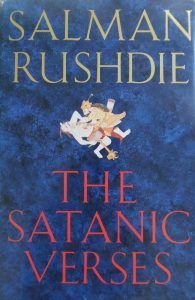Kevin Blankinship in the Los Angeles Review of Books:
 ON VALENTINE’S DAY 1989, the Supreme Leader of Iran, Ayatollah Khomeini, declared a death sentence on British Indian novelist Salman Rushdie for his book The Satanic Verses, along with any who helped its release: “I ask all Muslims to execute them wherever they find them.” The Ayatollah accused Rushdie of blasphemy, of sullying Islam and its prophet Muhammad, though many saw it as a desperate cry for popular support after a humiliating decade of war with Iraq. There followed riots, demonstrations, and book burnings across Europe and the Middle East. Death threats poured in. Viking Penguin, Rushdie’s UK publisher, was threatened with bombings. The author himself was forced into hiding under the pseudonym “Joseph Anton,” a mash-up of Joseph Conrad and Anton Chekhov and the title of Rushdie’s 2012 memoir of the controversy. The media and public still remember it as “The Rushdie Affair,” though most people born after the 1980s have never heard of it.
ON VALENTINE’S DAY 1989, the Supreme Leader of Iran, Ayatollah Khomeini, declared a death sentence on British Indian novelist Salman Rushdie for his book The Satanic Verses, along with any who helped its release: “I ask all Muslims to execute them wherever they find them.” The Ayatollah accused Rushdie of blasphemy, of sullying Islam and its prophet Muhammad, though many saw it as a desperate cry for popular support after a humiliating decade of war with Iraq. There followed riots, demonstrations, and book burnings across Europe and the Middle East. Death threats poured in. Viking Penguin, Rushdie’s UK publisher, was threatened with bombings. The author himself was forced into hiding under the pseudonym “Joseph Anton,” a mash-up of Joseph Conrad and Anton Chekhov and the title of Rushdie’s 2012 memoir of the controversy. The media and public still remember it as “The Rushdie Affair,” though most people born after the 1980s have never heard of it.
Unlike the recent attack on lampoon magazine Charlie Hebdo or the threats against Danish daily Jyllands-Posten, the creative text behind the Rushdie Affair was renowned as high art. It netted the 1988 Whitbread Award and was named a Booker Prize finalist (Rushdie had already won a Booker for his second novel, Midnight’s Children). It was lauded by the Who’s Who of 20th-century literature: Norman Mailer, Bruce Chatwin, Marina Warner, Joan Didion, Martin Amis, Nadine Gordimer, Peter Carey, David Lodge.
More here.
